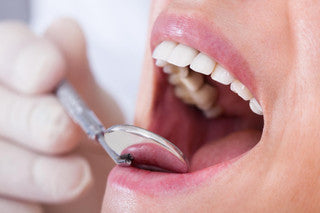Without warning, sores and growths can develop on or in your mouth. While most common mouth sores and growths do not pose as serious risk to the health of those affected, some require prescription medication or removal by a licensed professional. Without proper treatment these sores can sometimes obstruct normal activities such as chewing, speaking, and even breathing. Therefore, it is important to see your doctor if the sores continue to grow, last for several days or are painful.
What is a Canker Sore?
A canker sore is a small, shallow lesion that develops on the soft tissues of the mouth and at the base of the gums. These painful sores can make speaking and eating difficult. Although some people confuse canker sores with cold sores, the two are not the same. Unlike cold sores, canker sores do not occur on the surface of the lips and they are not contagious.
Symptoms of a canker sore include:
- Painful sore inside the mouth
- Tingling or burning sensation
- Round, white or grey sores with a red edge or border
Severe cases may include additional symptoms such as fever and swollen lymph nodes.
Canker sores usually go away without treatment within a week or two. Check with your doctor if you have extremely large sores that don’t heal after two weeks.
What is an Oral Mucocele?
An oral mucocele is a fluid-filled swelling commonly found on the lips, tongue, floor or roof of the mouth. These benign cysts range in color from clear to blue and often dissolve on their own. Although mucoceles are not harmful, they can last for several years. It’s important to see your dentist or doctor if mucoceles become large and uncomfortable or reappear frequently.
The symptoms experienced can vary depending on the location of the cyst and how often they occur. People that suffer from frequent cysts might experience increased discomfort overtime.
The most common symptoms of mucoceles include:
- Bluish-colored swelling
- Softness
- Lesions less than one cm in diameter
Causes of Mucoceles
Mucoceles typically appear after trauma to the mouth. Common causes include:
- Lip biting
- Cheek biting
- Piercings
- Accidental rupture of the salivary gland
- Crooked or jagged teeth
Diagnosis of mucoceles often occurs during a routine dentist appointment. Most of the time, these small cysts don’t cause any discomfort. Your dentist will examine the cyst and decide if further treatment or testing is necessary. Sometimes dentists order a biopsy or other diagnostic tests just to make sure there aren’t additional issues or concerns. Most of the time, your dentist will simply let the mucocele heal on its own. If this doesn’t occur within two months, or the cyst becomes large and uncomfortable, you’ll need to make a follow-up appointment with your dentist.
Individuals with poor dental hygiene and a habit of lip and cheek biting have a much higher risk of developing mucoceles. Sometimes people also develop these growths as a reaction to traditional tartar control toothpaste.
Using a high-quality dental gel like LIVFRESH can help keep the teeth and gums healthy. This revolutionary dental gel not only eliminates existing plaque, it also prevents it from forming in the first place. LIVFRESH cleans teeth 250% better than traditional toothpaste.

